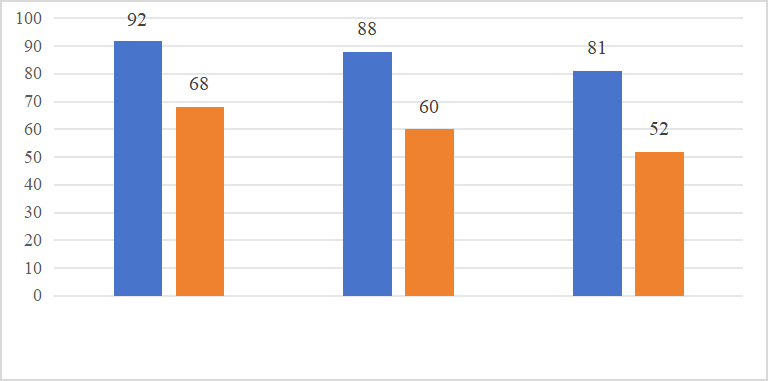

Volume 67
Published on June 2025Volume title: Proceedings of ICLLCD 2025 Symposium: Enhancing Organizational Efficiency and Efficacy through Psychology and AI
Perfectionism, particularly negative perfectionism, is often linked to psychological distress, including self-criticism, emotional suppression, and difficulties with self-acceptance. By offering a safe and creative space for expression through color, lines, and brushstrokes, painting therapy allows individuals to externalize repressed emotions and challenge rigid self-expectations. This study investigates how painting art therapy can serve as a non-verbal intervention to improve self-identity and emotional regulation among perfectionists. Through theoretical and case analysis approach, the research analyses the transformation of perfectionists' artworks, focusing on shifts from rigid, symmetrical designs to more fluid and expressive forms. These changes in artistic creation reflect emotional release and evolving self-acceptance. The findings suggest that painting art therapy facilitates emotional regulation by providing a channel for emotional release and supporting the development of a more authentic and stable self-identity. The study highlights the potential of this therapeutic method in clinical and educational settings, though it acknowledges limitations such as a small sample size and short intervention duration. Future research should explore the long-term effects of art therapy and investigate the integration of other therapeutic modalities to further enhance emotional well-being in perfectionists.

 View pdf
View pdf


Taking the Tao Te Ching as the object of study, this research explores the role of chapter coherence in the study of ancient Chinese texts and its theoretical significance. Based on Hume's three principles of association (similarity, spatial and temporal proximity, and causality), the article analyses how chapter coherence helps to reconstruct the logical structure and philosophical connotation of the text in the light of the experimental interpretation of the sentence reading controversy of the Tao Te Ching. By analysing the sentence-reading controversies of the passages ‘Namelessness is the beginning of heaven and earth; name is the mother of all things’, ‘There is always no desire to see its beauty; there is always a desire to see its mere existence’, and ‘The Tao is impulsive, but the use of it is not in abundance’, this paper reveals how chapter coherence helps to reconstruct the logical structure and philosophical connotation of the text, and explores its deeper significance for understanding Laozi's philosophical ideas of ‘to have’ and ‘to have not’. The study suggests that although sentence reading may affect readers' intuitive understanding, chapter coherence analysis allows for a more rational treatment of the text, optimising its readability while preserving its core philosophical connotations. In addition, the article also explores the value of chapter coherence research in the interpretation of implicit logical relations in ancient Chinese, pointing out its importance in lowering the threshold of textual comprehension and facilitating the dissemination of ancient ideas.

 View pdf
View pdf


The popularity of short video communication provides a new way of communication for popular music. As a popular short video platform, Douyin platform has become an important channel for popular music communication. This paper takes Douyin platform as an example, based on the analysis framework of use and gratification theory, discusses the communication effect of pop music and short video fusion, and how pop music meets the needs of users through visual communication. The research results show that the visual communication of pop music in the Douyin platform significantly enhances the appeal and interactivity of music, meets the needs of users in entertainment, social networking and information acquisition, and enriches the user 's music experience. This study provides a theoretical basis and practical guidance for the formulation of music communication strategies for each platform.

 View pdf
View pdf


This narrative review synthesizes current evidence (2015-2024) on the dual impact of screen use on the mental health of people with disabilities. While excessive screen time and cybervictimization may exacerbate anxiety, depression, and social isolation, moderated and purposeful screen engagement--particularly through adaptive gaming, virtual social platforms, and telehealth interventions--demonstrates therapeutic potential. Key findings reveal that screen-based interventions can alleviate loneliness, enhance cognitive and social skills, and foster identity reconstruction through inclusive online discourse. The use of electronic screens can also provide assistance for the mental health intervention of the disabled. Electronic screens are excellent carriers of information such as pictures and texts, and also a good way for communication. However, risks such as sleep disruption, impulsivity, and digital exclusion persist, especially among individuals with intellectual or developmental disabilities. The review highlights the need for culturally sensitive, longitudinal research to optimize screen-mediated mental health support while addressing accessibility and ethical challenges.

 View pdf
View pdf


Driven by the momentum of the digital era, performance design is undergoing a significant transformation towards intelligentization. As a key force in the integration of technology and art, generative artificial intelligence (AI) is deeply involved in various stages of performance design, including creative content generation, real-time interaction, system optimization, and adaptive control. This evolution signals a shift from traditional, tool-assisted methods to dynamic modes of human–AI co-creation, and in some cases, AI-led design paradigms. While generative AI has already demonstrated promising applications in performance design, significant challenges persist, particularly in ensuring technical reliability, clarifying copyright ownership, and fostering effective human–AI collaboration. This paper examines the intervention contexts, functional categories, and technical architecture of generative AI in performance design, and further explores the prevailing issues and challenges associated with its application in this field, aiming to provide both theoretical foundations and practical strategies for the advancement of intelligent performance design.

 View pdf
View pdf



With the rapid development of Artificial Intelligence-Generated Content (AIGC) technology, the creation of film and animation is undergoing a paradigm shift. Taking the AIGC short film Goodbye Rabbit as a case study, this article systematically examines its application in pre-production planning, visual design, production processes, and post-production optimization, exploring the models and advantages of AIGC-empowered animation short film creation. Through case analysis, the article highlights AIGC’s significant advantages in lowering creative barriers, enhancing production efficiency, and enriching audiovisual imagination. However, challenges such as ambiguous authorship, aesthetic homogenization, and unresolved copyright ownership are also identified. The study argues that AIGC should serve as an “assistive creator” to support human artistic expression. Future efforts should focus on optimizing human-machine collaboration mechanisms, technological ethics, and aesthetic standards to provide innovative momentum and value guidance for the animation industry. This research aims to offer theoretical and practical insights for AIGC-driven film creation and academic discourse.

 View pdf
View pdf


In recent years, social media platforms have increasingly adopted algorithm-driven content delivery mechanisms that personalize user experiences by tailoring recommendations based on interactions such as liking, sharing, commenting, and saving content. This approach, often referred to as the "information cocoon" effect, significantly shapes the digital information landscape by creating highly individualized content streams. The information cocoon algorithm in daily life can enhance users' engagement and cohesion, but at the same time, it limits the exposure of diverse viewpoints, amplifies cognitive biases towards certain fixed opinions, and increases vulnerability to misinformation. This paper critically analyzes the mechanisms through which algorithmic recommendations foster information cocoons and identifies associated risks, including misinformation propagation, social polarization, and algorithmic discrimination. Utilizing a systematic literature review, this study proposes mitigation strategies encompassing enhanced algorithmic transparency, regular independent audits, content diversification, digital literacy enhancement, and regulatory oversight, aiming to safeguard information security in the algorithm-dominated social media landscape.

 View pdf
View pdf



Unlike traditional social platforms, short video platforms analyze users' interest preferences, viewing behavior, and interaction records in real time through big data and artificial intelligence algorithms, providing personalized content recommendations. While this customization improves user experience and platform engagement, it has also led to a certain degree of content convergence. This study explores how algorithms drive content style convergence on short video platforms and influence users' creative intentions and aesthetic preferences. The research highlights that while recommendation algorithms enhance user experience, they also contribute to the homogenization of content creation. Moreover, platform design and communication mechanisms play a crucial role in shaping public perceptions of aesthetics, entertainment, and social values. By analyzing platform algorithms and their underlying mechanisms, this research offers a theoretical foundation for improving short video platform design and reflects on the ethical responsibilities these platforms bear in shaping digital culture. However, the study has certain limitations, including the reliance on qualitative and platform-based analysis without extensive empirical user data or creator interviews. Future research could benefit from a mixed-methods approach that includes quantitative user engagement data and qualitative interviews with content creators and platform engineers.

 View pdf
View pdf


Oscar Wilde’s masterpiece The Picture of Dorian Gray employs a distinctive aestheticist style to narrate the story of the protagonist Dorian Gray, who attempts to trade his soul for eternal youth, only for his moral transgressions to manifest on his portrait. The novel not only reflects Wilde’s profound meditations on human nature, art, and morality but also portrays a series of female characters, such as Sibyl Vane and Lady Brandon, whose emotions and destinies resonate with natural imagery, revealing intricate interactions between humanity and nature. This article adopts an ecofeminist perspective to unearth the latent ecological and gendered dimensions of the text, focusing on the intertwined representations of “ecology” and “the feminine.” It seeks to expose the oppression both endure under patriarchal structures and the intrinsic connections between them. On one level, the study examines the symbolic significance of nature in the novel, linking its degradation to Dorian Gray’s moral decay, thereby uncovering the text’s implicit anti-ecological critique. On another, it scrutinizes the female characters, analyzing their marginalized status within patriarchal society and their shared plight with nature. In a broader context, this analysis invites readers to reflect on contemporary ecological and gender issues, advocating for a harmonious coexistence between humanity and nature, as well as between men and women.

 View pdf
View pdf



Education informatization is of great significance in promoting urban-rural education equity and is highly expected by academics and policymakers. However, without proper planning, it may exacerbate disparities instead of bridging them. This study examines how information technology can enhance urban-rural education equity, its impact on education quality, and effective strategies to narrow the gap. Using a mixed-methods approach, the study combines literature review, case studies, and questionnaire surveys targeting educators, students, and parents in regions with significant urban-rural disparities. The results of the study show that the informatization reform has promoted the sharing of educational resources between urban and rural areas to a certain extent, but the actual effect is constrained by a number of factors, and greater efforts are needed in terms of technology popularization, policy support and social resource inputs in order to achieve real equity in urban and rural education.

 View pdf
View pdf




